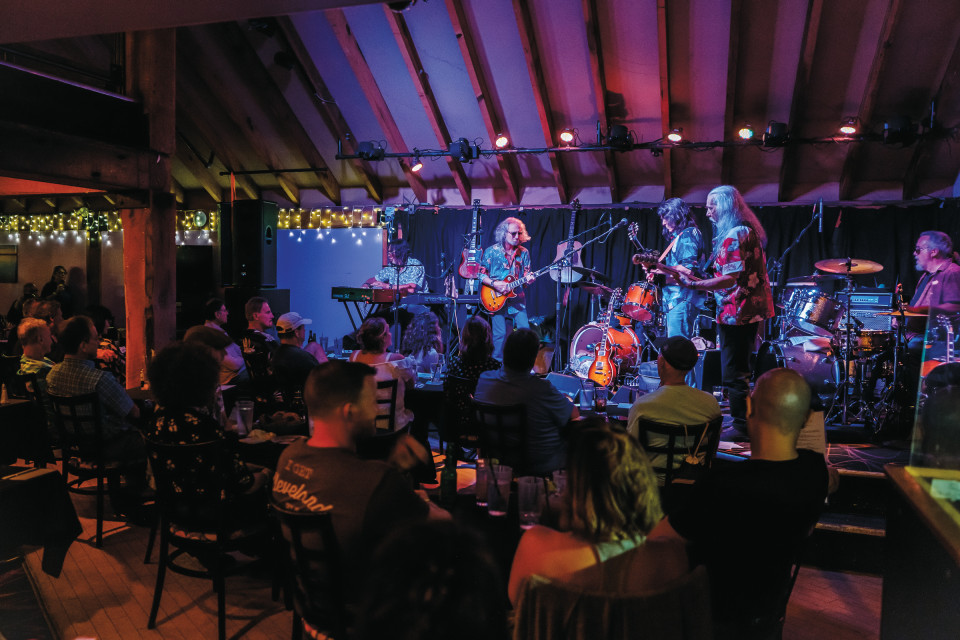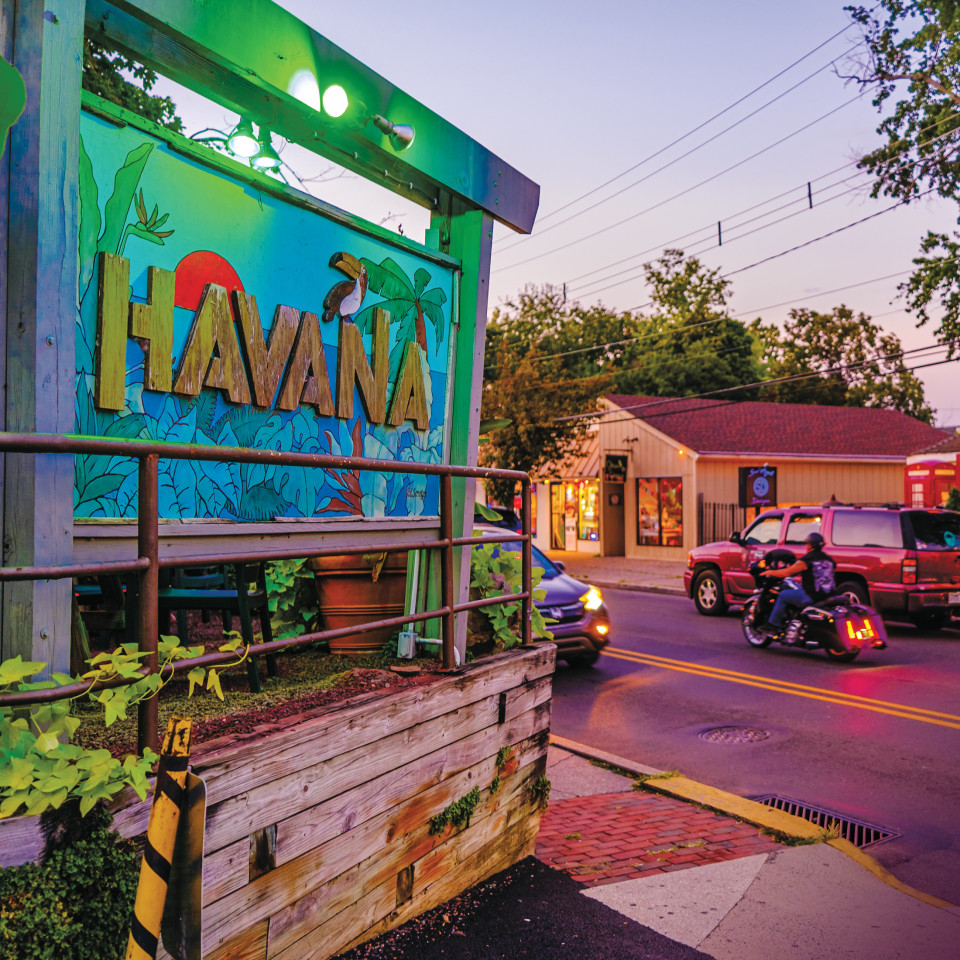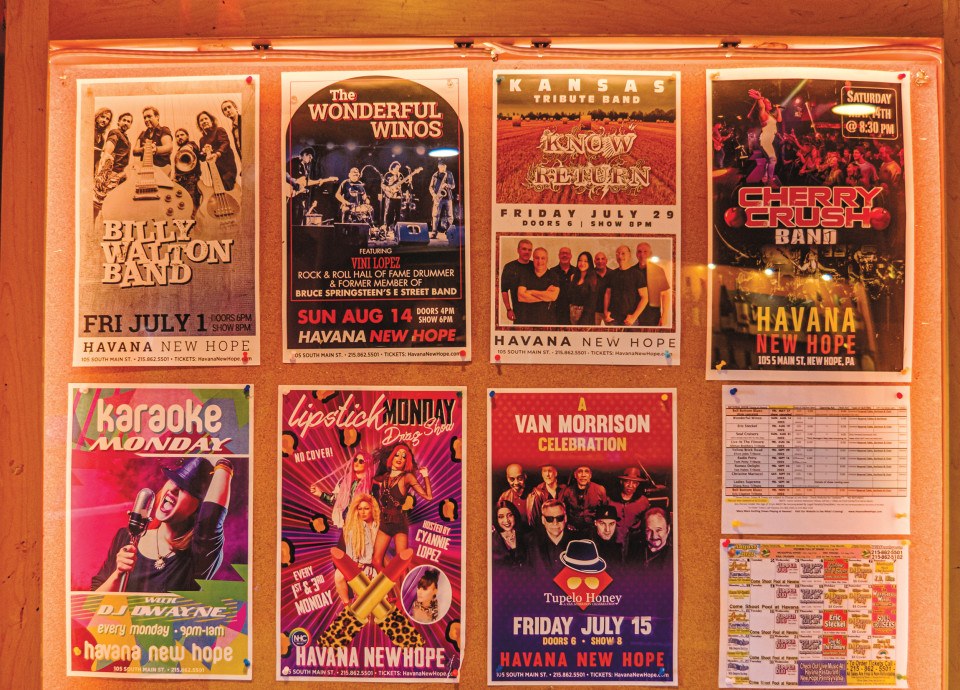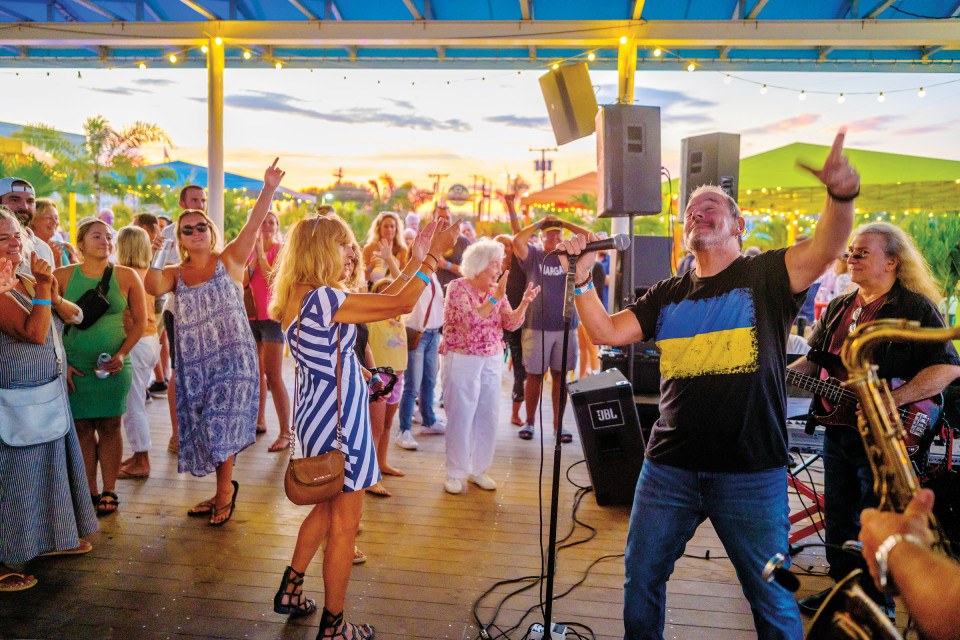Tribute Bands Are Having a Moment and New Hope Is at the Center of it All
The Bucks County river town has become the heart of a thriving regional scene. Here’s why these acts — and we — keep holding on.

Allman Brothers tribute band Live at the Fillmore plays Havana on August 26, 2022. / Photography by Jeff Fusco
This is the kind of night New Hope was built for. On a hot Friday in July, two venues in Philadelphia’s favorite Bucks County retro-hippie river town have scheduled competing tribute-band rock shows.
The New Hope Winery is hosting Dirty Deeds, a group of musicians from Massachusetts who authentically simulate an AC/DC concert. At Havana, a local band called Fooling Ourselves is performing the collected works of Styx. Fooling Ourselves is opening for Know Return, a tribute to prog-rock band Kansas. Actually, Fooling Ourselves and Know Return are the same guys; they have two separate tribute bands. They warm up for themselves. My challenge is seeing it all.
Inside Havana on Main Street, three keyboards (Styx!) stand among the gear arranged on a little corner stage. A crowd of maybe 200 fills the club to near capacity. This is a Friday-night show at a venue that has booked national acts for decades. Fooling Ourselves takes the stage: six middle-age guys basically in jeans and sneakers, plus a female violinist in black leather and heels.
Patrick Igoe, patent attorney by day, croons the prelude to “Rockin’ the Paradise.” Then the band kicks in, and now we rock. Guitarists Sean Reiter, a radiologist by trade, and Dave Boardman, a car pinstripe artist, stroke power riffs. Drummer and backing vocalist Bob Falgie, who owns a hair salon, bangs. The crowd grooves.

Havana, which anchors a bustling tribute-band-based nighttime economy on New Hope’s Main Street
The musicians storm the Styx canon: “Too Much Time on My Hands,” “Grand Illusion,” “Lady,” “Renegade.” Bassist Howard Whitman, who’s also in a Cars tribute band called You Might Think, takes the lead singing “Fooling Yourself (The Angry Young Man).” Chuck Whitmore, owner of a marketing agency, nails the song’s soaring keyboard solos. Good tribute bands can be like an Impossible Burger — a surprisingly tasty substitute for real meat, even if a note of the original flavor is absent, which might be … the blood?
Boardman announces: “Fooling Ourselves is going to take a break, and Know Return is coming up. See how quick that was?” Just like that, they’re a Kansas tribute band, launching into “Point of Know Return.” Petula Perdikis steps up with her electric violin to fiddle the song’s frantic arpeggios. Kansas is known for complex time signatures and key changes. Perdikis is principal violist with the Lancaster Symphony Orchestra. She tours the world playing classical music.
“I have to tip my hat to Kansas,” she tells me later. “There were three or four songs that were pretty challenging to learn because of the meter changes. I was learning them at the same time I was playing Copland’s Appalachian Spring and thinking, wow, this is like playing Copland.”
I sprint to my car and arrive at the New Hope Winery as Dirty Deeds is moving from “Who Made Who” into “Thunderstruck.” Winery shows are in a big shed behind the restored barn the owners use as a restaurant. It has a paneled-basement vibe, but this feels like an arena show. Lights flash, and the room seems to be pulsing. Lead singer Bob Conti howls: “I was caught/In the middle of a railroad track.” Thunder! “I looked ’round/And I knew there was no turning back.” Thunder! He sounds and looks just like AC/DC’s Brian Johnson. He wears the same flat cap and sleeveless denim shirt. He’s 73 years old.
Matt Shane, a 22-year-old with a mop of brown hair, is dressed like Angus Young, in full schoolboy uniform. Almost every AC/DC song has a monster guitar solo, and Shane uses these occasions to duck-walk across the stage just like his idol, thrashing Young’s trademark Gibson SG.
The last real AC/DC concert was in 2016, in Philly. The band’s other guitarist, Malcolm Young, died in 2017. This is like an opportunity to see them play in your middle-school gym. And if the real AC/DC did a gig in your school gym, how different would it be?
For the finale, Conti grabs an American flag off the wall and stomps to center stage. Marybeth Sullivan-Dowdell, in a tartan kilt, plays “America the Beautiful” on bagpipes, and the band cranks into an exhilarating rendition of “For Those About to Rock (We Salute You).”
Winery shows have a hard stop at 10 p.m., to cut noise for neighbors. It’s nice. The band mingles and poses for photos with fans.
“We had our own original bands. I had mine on MTV,” Conti tells me. (His ’80s hair-metal band was called Touch.) “Now I’m making believe I’m somebody else, and I’m more popular than ever.”
America has reached peak rock tribute, and I am here to make the case that New Hope is the global epicenter — the point on Earth with the highest concentration of these shows. If every tribute band had a spotlight shining on it, I’m pretty sure you could see New Hope from outer space.
In recent months, Havana has hosted Frontiers (Journey tribute), Romeo Delight (Van Halen), Shock the Monkey (Peter Gabriel), A Brothers Revival (Allman Brothers), Tupelo Honey (Van Morrison), Rainbow Full of Sound (Grateful Dead), Live at the Fillmore (more Allman), Countdown to Ecstasy (Steely Dan), and Yellow Brick Road (Elton John) — and those are just the fun names. New Hope Winery’s calendar included Laurel Canyon (CSNY), the Ledbetters (Pearl Jam), Journeyman (Eric Clapton), Highway Run (Journey), and Unforgettable Fire (U2). The Bucks County Playhouse in New Hope gets in on the act, too, having staged tributes to Simon & Garfunkel, the Beatles, Neil Diamond, Roberta Flack and other artists.

Tribute bands advertised at Havana, New Hope
New Hope is the nucleus of a teeming tribute-band biome that engulfs the region, from Montgomery County to Bucks and reaching east to the sea. This summer’s Sellersville Theater lineup featured Kick (the INXS Experience), the Machine (Pink Floyd), and Southern Accents (Tom Petty). Bensalem’s public concert series included Philadelphia Freedom (Elton John), Desert Highway (Eagles), Hollywood Nights (Bob Seger), Beginnings (Chicago), Real Diamond (Neil), Sail On (Beach Boys), Bad Animals (Heart), Double Vision (Foreigner), and Tramps Like Us (Springsteen).
In fact, on the same night Dirty Deeds scorched the winery and Fooling Ourselves/Know Return rocked Havana, the Journey tribute band Frontiers had an outdoor show in West Windsor, New Jersey; Pure Petty (a Tom tribute) was at Cooper’s Riverview in Trenton, and a Buddy Holly act played Long Beach Island.
Multiple forces have collided to form this tribute vortex.
Number one: More than ever, rock bands are rock brands. They never really leave us. On the Tom Petty satellite radio station, you can hear Petty himself doing shifts as deejay despite his 2017 death. Through a relentless stream of biopics, jukebox musicals, classic rock radio, album reissues, TV commercials, video games, hologram concerts and tribute bands, our rock heroes and their classics remain eternal. Recent industry data says old songs — defined as those released at least 18 months ago — comprise 70 percent of U.S. music consumption (sales and streaming). As fans, we don’t want to let go, and we don’t need to.
Two: Fans are seizing the means of entertainment production. User-generated variants of original things have forged their own lane. From fantasy football leagues where your pretend team can win no matter what real teams do to a musical version of Bridgerton developed on TikTok, fans are taking possession of what’s out there and twisting it into new products.
Three: what Paul Sinclair, lead singer in Zeppelin tribute band Get the Led Out, calls “the Purge.” “Around 2015, we began losing everyone,” he says: Prince, Petty, David Bowie, Eddie Van Halen, Glenn Frey of the Eagles, Lemmy from Motorhead, Chris Cornell of Soundgarden, Scott Weiland of Stone Temple Pilots, Malcolm Young, Meat Loaf. “Everyone just dying left and right. And you realize, ‘Oh my God, who’s gonna be around to play this music?’ We knew there was gonna be a day when they all pass. But it’s like the time frame got moved up.”
These trends create a culture in which tribute bands replicate. It’s economics that have pushed the venues.
“We’ve been doing music for about 27 years,” says Mark Stevens, who owns Havana in New Hope and so can be held partly responsible. “We went real heavy with national acts in the 2000s, and I guess around 2010 started to sprinkle in a few tributes. You discover right off the bat that their riders aren’t as demanding, the price you have to pay is not as high, and the profit tends to be better. We started to just shift gears and put in a lot of tributes.”
“With COVID,” explains Sandra Price, owner of the New Hope Winery, “there were a lot of national acts that lost their shows, and they had makeups to do. So it was almost impossible to book a national act. Tributes were available.” And they can be less risky, she tells me, than bringing in Keb’ Mo’ for $20,000 and having to charge $100 a ticket (which she did). Tribute bands get maybe $2,500 to $8,000 per gig.
The equation works for all involved. Fans tend to be suburban, white, some mileage on their oldometers, seeking low-impact nostalgia trips. New Hope, with its vintage record and candy stores, its tie-dye and head shops, is flashback-friendly.
“When you’re in your 30s, your 20s, you love going to a rock concert with 100,000 people,” Stevens figures. “As you get into that 40-plus range, with kids, maybe you’d prefer it a little quieter, a little more private. New Hope lends itself to that whole package. You go for a stroll. Get ice cream. Shop for antiques. See a tribute show.”

New Hope’s Main Street
Tributes can be a comfort zone for fans who, post-COVID, go out less and hope to make the night count.
“In my opinion, the number one reason is people know what they’re going to get,” Andy Smith, executive director of the Newtown Theatre, tells me. The vintage theater, which opened in the 19th century about 10 miles from New Hope, last year underwent a $600,000 renovation. Part of Smith’s plan to recoup the money is booking tribute acts like Ronstadt Revue, Dead Letter Office (R.E.M.), Damn the Torpedoes (Petty), and WailOn (Waylon Jennings). “I want to book more original acts, but right now, the tributes are what people seem to want. If you get in original artists and people haven’t heard the music, they seem far less willing to take a chance.”
“People might want to see Fleetwood Mac and they can’t afford a $600 ticket,” Price tells me. “But you can pay $60 to see Tusk. And I think they’re just as good.”
When tickets for Bruce Springsteen and the E Street Band’s 2023 tour went on sale in July, seats at the Wells Fargo Center were priced like ransom for the Lindbergh baby. But on Sundays this summer at Point Pleasant Beach, you could see a free show by the B Street Band. That’s only three blocks’ difference!
So on a hot Sunday, I drive my sleek machine over the Jersey state line to the Jenks Club, a beachside bar on the ticky-tacky Point Pleasant boardwalk. I find some diehards who’ve come explicitly to see B Street, and they help me pre-game.
“They do a great ‘Rosalita,’” says Dave Mital, a financial planner from Oakland, New Jersey. “It takes me back to high school. I’m 65 years old.” He says he’s seen the real Springsteen at least 15 times but didn’t get selected to buy tickets for 2023. “So here we are — second-best!”
“Watch the crowd reaction,” advises Tim Munson, a 50-year-old from Oak Ridge, New Jersey, wearing a straw cowboy hat and a Hawaiian shirt. He tells me he’s seen the B Street Band 80 or 100 times since he was a teenager.
Lead singer Glenn Stuart comes out in a white tee, jeans and work boots, like Bruce on Born in the U.S.A. The moment he opens his mouth, I’m like, Whoa-oh-a-ohhh, this could be legit. He sings through a clenched jaw with an occasional Southern accent even though he’s from central Jersey, just like Bruce does. By the third tune — “She’s the One” — the crowd, ranging from early 20s to at least 70, is swaying and singing the chorus, while Steve “Poz” Pozzelanti drums a Bo Diddley beat. On “Rosalita,” Rick Cyr makes his sax scream, and there’s a physical jump in the room. To be honest, I can’t believe the energy these guys are blasting in this fake resort bar with golf on its flat-screen TVs.
During “Tenth Avenue Freeze-Out,” a woozy guy notices I’m holding a reporter’s notepad and says he has a quote for me. I lean in close. He yells: “PARTY HEARTY!” During “Jungleland” and “Thunder Road,” in the band’s second set, there must be 50 people in front of the stage reciting Springsteen’s desperate poetry, word for word, like church.
Studies have shown that music can cause a release of the pleasure hormone dopamine in the brain. Nostalgic music becomes a megadose by adding happy memories — Glory Days! — and thus activating reward centers in the skull, including the hippocampus, substantia nigra, ventral tegmental area, and ventral striatum. Not to mention all the alcohol.
“We give them a couple hours where they can forget everything else,” figures Will Forte, the keyboardist from Hazleton who founded the B Street Band. I talked to Forte on the phone as he packed gear to play a gig in Scranton — an anniversary party for a couple who met at one of his shows. He started B Street in the primordial days — 1980 — and calls it the world’s longest-running tribute band. Since then, they’ve played for crowds as large as 50,000 (and New Hope many times).
But when Forte first took the idea to the Stone Pony, the legendary Asbury Park club, the owner told him it would never work.
“Back then, there was only Beatlemania and some bad Elvis impersonators,” he says.
In 1978, a new kind of musical opened on Broadway. Beatlemania was four actors performing Beatles hits, costumed to look like them. TV commercials hawked the show as “Not the Beatles, but an incredible simulation.” (The phrase became a cultural meme for a generation; in 1992, Spy magazine called Slobodan Milosevic “not Hitler, but an incredible simulation.”) The Beatles had disbanded in 1970 and stopped giving concerts years before, so even imitators were a sort of treat.
A lawsuit didn’t stop the show from touring, and suddenly, the tribute band was a thing. (Legally, any band can cover any song in a venue that pays fees to performance-rights organizations BMI, ASCAP and SESAC. In theory, money goes to songwriters.)
The Black Sabbath tribute Sabbra Cadabra, starring South Jersey HVAC repairman Joe Donnelly as Ozzy Osbourne, was a Philly-area pioneer in the 1990s. Paul Sinclair, from Blue Bell, originally had his own band, named Sinclair, and remembers, “We were opening for a Zeppelin tribute band called Kashmir in the late 1980s at the Chestnut Cabaret. We felt bad for them: ‘Why don’t you do your own music?,’ you know?”
Things change. “We had so many near misses and almosts with record companies, but we never got the big deal,” Sinclair says. In 2003, he co-founded Get the Led Out. Now they perform Zeppelin classics in venues like Colorado’s 9,500-seat Red Rocks Amphitheatre — and have their own tour bus.
Tribute bands gained prestige above generic cover bands. The audiences may seem niche, but musicians think it helps them stand out. “You get fans of that band, not people who are going out to a bar and incidentally hear your music,” says two-band lawyer Patrick Igoe. “We get better gigs because we just do Styx or Kansas.”
And so our region, once celebrated for powerhouse cover bands like Mr. Greengenes and Strange as Angels, became a breeding ground for tribute acts like Countdown to Ecstasy, Romeo Delight, Live at the Fillmore, Highway Run, the Ledbetters, Broken Arrow (Neil Young), Super-unknown (Soundgarden), Box of Rain (Dead), the Glimmer Twins (Stones), and Clapton America.

Glenn Stuart fronts the B Street Band at the Point Tiki Bar in Somers Point on July 29, 2022.
Every tribute band has choices to make. Do you need to resemble the original guys? If you’re the Stones, a frontman who moves like Jagger seems imperative. Brad Thorne, guitarist for Jersey-based Guns ‘N Roses tribute Paradise Rose, didn’t start out dressing like Slash but realized he had to. “I grew my hair because I don’t like wearing a wig,” he says. “It’s the same kind of clothing he wears. The wallet chain, the handkerchief thing hanging down. His hat. I take it pretty seriously.”
Kansas fans are more intense about music than wardrobe, Boardman says. “We had a fan on Facebook who complained that we changed one word,” he recalls. “We did get a post the other day, a bit of a joke, that said somebody in the band really should have hair.”
And then there’s picking a band name. You gotta love the ones that embrace the incredible simulation: the Rolling Clones, Faux Fighters, Proxy Music, the Doobie Others, Pink Fraud, Led Zepplica, Almost Queen, Rumours of Fleetwood Mac, Aeromyth, Non Jovi. Bands of female musicians often highlight the gender bend: Hell’s Belles, Iron Maidens (with Essington’s Courtney Cox on guitar), the Ramoms (from South Philly), the She Street Band, Misstallica (also Philly), Judas Priestess, Hervana, Lez Zeppelin. I think my favorite is a Band tribute band called “The The Band Band.”
Gesenia Gerena, lead vocalist for Ronstadt Revue, grew up in a Puerto Rican neighborhood in North Philly. She discovered she had great pipes as a teenager and started singing in English and Spanish — stuff by Linda Ronstadt, Whitney Houston, Celia Cruz. She recorded a salsa album in 2003. In 2016, she advertised for musicians to build a Ronstadt tribute show.
“People were talking about calling ourselves the Stone Phoneys. But it’s not a joke for me,” she says. (Ronstadt’s pre-solo band was the Stone Poneys.) She thinks “tribute band” feels disparaging. “I like to describe us as a celebration of her life and her music. I mean, think about Yo-Yo Ma, who does a celebration to all these beautiful classical artists. They don’t call him a tribute band,” she reasons. Ronstadt’s biggest hits were cover versions anyway.
On a Friday night in July, the crowd of about 200 for Ronstadt Revue at the Newtown Theatre skews female. The hair skews gray. Gesenia (professionally, she uses her first name) evokes Linda visually but casually: a flowery dress with bell sleeves, knee-high boots, bangs on her forehead. She starts belting out hits with her band.
On “Different Drum,” Dave Hartl, a classically trained pianist who has worked with Smokey Robinson and Aretha Franklin, makes his keyboard ring like a harpsichord. During “When Will I Be Loved,” drummer Tim Reeder crashes his cymbals; bassist Nick Frese and guitarist Bob Leonetti harmonize. On “You’re No Good,” Dave Lenat bends strings up his guitar neck for the solo, a riff that to me is the sound of the ’70s.
Gesenia leads the crowd in singing happy birthday to Linda, who turned 76 in July. Ronstadt, suffering from Parkinson’s disease, hasn’t sung live in years. But Gesenia’s voice grows stronger through the night. When she hits the high note to end “Blue Bayou,” the reserved crowd cheers and whistles.
In November, Ronstadt Revue will play the New Hope Winery, passing through that essential crossroads on its tour of America. When they reach California, they’ll be joined by John Beland, a guitarist who toured with Ronstadt at the start of her solo career. Beland sat in with the Revue earlier this year and told me, “It was déjà vu. I’m sitting up there, and she resembles Linda a little, and there’s a voice in my ear while I’m playing acoustic guitar on ‘Long Long Time’ like I did with Linda. I felt like I was back in 1970.”

Rick Cyr of the B Street Band at the Point Tiki Bar in Somers Point on July 29, 2022
The line between fantasy and reality is blurring. Know Return violinist Petula Perdikis has performed with John Elefante, vocalist for the real Kansas. E Street Band members Max Weinberg, Steven Van Zandt and Clarence Clemons sat in with the B Street Band. Jason Bonham, son of late Zeppelin drummer John Bonham, has his own Zeppelin tribute show. David “Rook” Goldflies, who played bass with the Allman Brothers, leads A Brothers Revival, which feels entitled to label itself a “legacy” band.
There actually will be a day when none of the classic rock groups exist anymore. Then what? Gene Simmons has talked about hiring four young musicians to put on the makeup and tour as Kiss. Queen’s Roger Taylor and Brian May auditioned players to create the Queen Extravaganza, the “official” Queen tribute band. If bands are brands, can franchising be far off? Quiet Riot already has toured with none of its original members. What is that, exactly?
One tale everyone in the tribute world knows is the story of Arnel Pineda, now the lead singer for Journey. In 2008, desperate to find the group a new vocalist, Journey’s guitarist, Neal Schon, searched YouTube and saw a blurred but jaw-dropping video of Pineda singing the Journey song “Faithfully” with a band called the Zoo, to mostly empty seats at a bar in Manila. Schon said, “That’s the guy.” He e-mailed Pineda: “Interested in singing with the real Journey?” Don’t stop believin’.
Published as “Don’t Stop Believin'” in the October 2022 issue of Philadelphia magazine.


